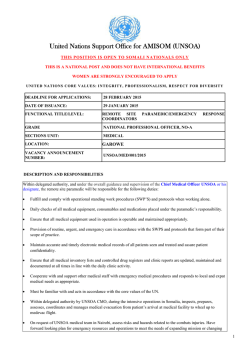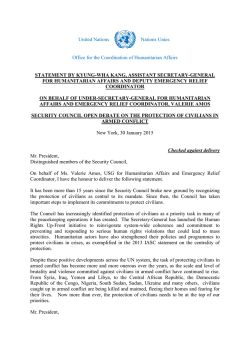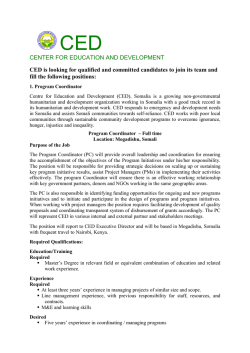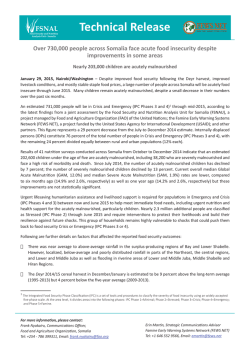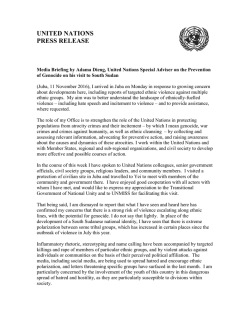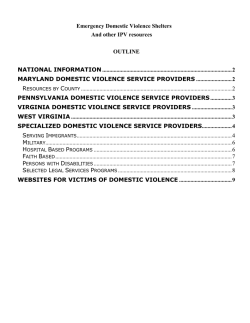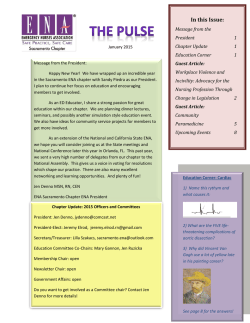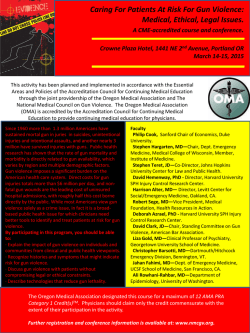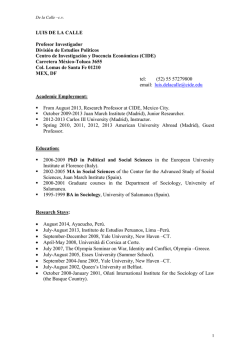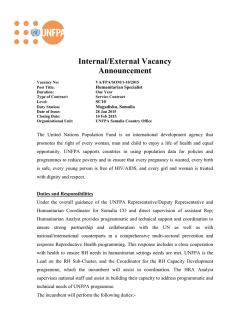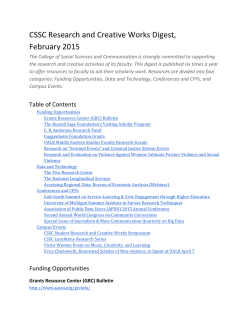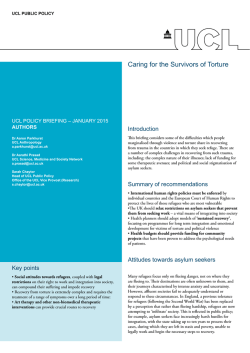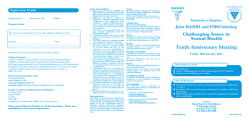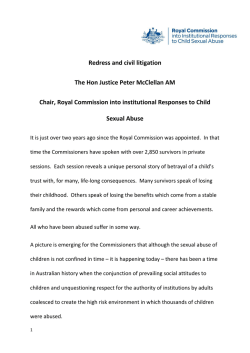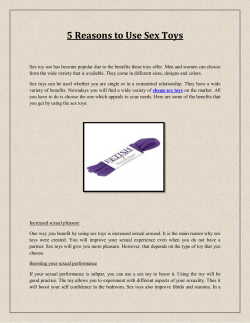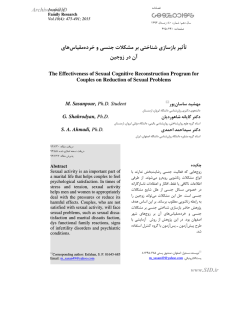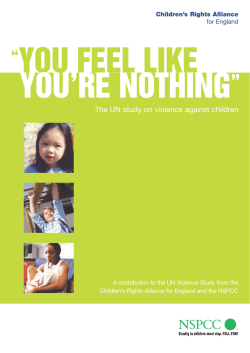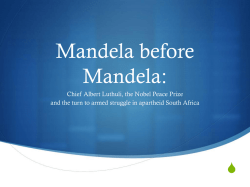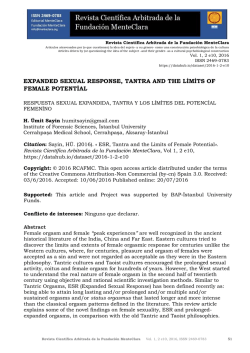
Statement to the UN Security Council open debate on Protection of
NGO WORKING GROUP ON WOMEN, PEACE AND SECURITY 777 United Nations Plaza New York, New York 10017 TEL: (+1) 212.557.7298 WWW.WOMENPEACESECURITY.ORG CHECK AGAINST DELIVERY Statement by Ms. Ilwad Elman UN Security Council Open Debate on Protection of Civilians in Armed Conflict “Protection challenges and needs faced by women and girls in armed conflict and post-conflict settings” 30th January 2015 Mr. President, Excellencies, Ladies and Gentlemen, Good Morning, Just days ago in Mogadishu, the mother of a 14-year old girl called me. Her daughter was raped two years ago by a Ugandan Soldier in the African Union Mission on Somalia (AMISOM). The soldier returned to Uganda, where he remains in detention awaiting trial. The mother often calls me, not to get an update on the case but to help her daughter, who has been labeled the “girl who was raped by the infidel” and has been ostracized by her community. The nature of my work, providing emergency, life-saving services to survivors of sexual and gender based violence, is to respond to such calls and provide any support I can. I am here today, with a heavy heart; as a representative of the NGO Working Group on Women Peace and Security;1 as a Director of the Elman Peace and Human Rights Centre in Somalia, founded by my late father who was killed advocating for human rights; and within my capacity as the Youth Ambassador for Somalia on Sexual Violence in Conflict. I returned from the comforts and safety of Canada to Somalia 5 years ago, because I believe we all have a role to play in the peaceful transition out of conflict. I have seen first-hand the catastrophic consequences of violence against civilians and of protection strategies which are gender blind and have failed to meaningfully include women. In many contexts, as in the case of South Sudan and the Democratic Republic of Congo, women continuously report feeling unsafe. Food distribution sites are set up in areas not easily accessible. Women and girls must collect food, firewood and water for their families, often risking rape and abduction when doing so. Latrines continue to be built without locks and without regard for the need for sex-segregated facilities to ensure safety and privacy. Sanitary napkins and other basic hygiene supplies are still deemed luxuries rather than necessities. There is a need for more responsive channels for women to communicate with humanitarian officers and peacekeepers about their immediate protection concerns. This communication is often dramatically enhanced when women themselves are serving in roles such as peacekeepers and police. In 2014, however, we witnessed the deliberate exclusion of women from these processes in Somalia, when more than 700 women were dismissed simultaneously from their posts within the Somali National Armed Forces. Additionally, women-led civil society groups who are able to speak to the underlying drivers of violence and the protection rights and needs of women are often undermined, harassed and threatened. I speak from personal experience, and I have lost too many friends, colleagues and family members. In order to advance women’s inclusion in addressing these challenges, I urge the Security Council to: 1 Mandate inclusive, gendered decision-making in the design, implementation and monitoring of protection of civilian strategies, including those responding to acts of gender based violence. This means consulting women from the beginning, including those displaced and with disabilities. Take the necessary steps to increase the number of female staff in peacekeeping operations, including both military and police components. The NGOWG is comprised of Amnesty International; Consortium on Gender, Security and Human Rights; Femmes Africa Solidarité; Global Justice Center; Human Rights Watch; The Institute for Inclusive Security; International Rescue Committee; Refugees International; Open Society Foundations; Women’s Refugee Commission; Women’s Action for New Directions; Women’s International League for Peace and Freedom Ensure all missions with Protection of Civilian mandates have adequate logistical support and resources, including the full deployment of human rights officers, gender experts and women protection advisors. Address the protection needs of all of us humanitarian workers and women human rights defenders who are increasingly targeted, disappeared and abducted. The Security Council must also simultaneously and urgently act to prevent the blatant misuse of power and the sexual exploitation and abuse we are witnessing in Somalia and in other countries. I speak on behalf of the 14 year old girl and her mother as well as the thousands of other survivors in urging the Security Council to reinforce the UN Zero Tolerance policy and prevent those deployed to protect communities from themselves becoming the violent perpetrators, too often with impunity. Mechanisms for reporting human rights abuses, including sexual and gender based violence, must be gender-sensitive, confidential, and non-discriminatory, as the fear of stigma, discrimination and possible retribution often deters survivors from coming forward and seeking judicial or other forms of assistance. This requires engagement with affected women in a safe and respectful manner as well ongoing consultation. To protect women from these human rights abuses and to ensure accountability, I urge the Security Council as a matter of priority to: Insist on accountability for atrocities committed by all armed groups and security forces, including addressing sexual and gender based violence and civilian casualties; reinforce efforts to ensure justice systems are re-established, with investigations and prosecutions conducted in accordance to international standards. Ensure that troops are adequately vetted, prepared and trained; and that they engage in confidence building measures with the local populations, including those displaced. Hold troop contributing countries accountable for these crimes and call for all investigations and monitoring of human rights abuses by AMISOM and by peacekeeping personnel across other missions to be included in all public reporting on the human rights situation in that country. Mandate that sex-disaggregated data be included in peacekeeping mission reporting. See to it that UN protection focal points provide clear, accessible and confidential complaints mechanisms to survivors of sexual exploitation and abuse. Protecting civilians is also about ensuring that people can live without fear. In Somalia, as in places such as Syria, Gaza, Nigeria and Ukraine, we have witnessed civilians in populated areas being targeted, injured and killed by explosive weapons. The impact of explosive weapons in populated areas must be addressed, and international cooperation is needed to set stronger standards to protect civilians. The experience of AMISOM has shown that policies to limit the use of mortars or other indirect fire explosive weapons can help save civilian lives. Implementation of international humanitarian law (IHL) in a gender responsive manner is key to enhancing the protection of civilians. Women must have equal access to accountability mechanisms, reparations and non-discriminatory medical care, including safe abortion and post-abortion care for survivors of sexual and gender based violence. Women must also be granted equal nationality rights. Women in Somalia remain largely under-represented as political leaders, candidates, civil servants and elected officials. Ahead of next year’s elections, it is imperative that the UN supports a process which leverages the political inclusion and participation of women, strengthens Somalia’s security sector, and promotes respect for human rights. During last year’s state formation process in South Western Somalia, not a single woman was elected at any level of this new administration, despite the overwhelming numbers of female candidates. I am confident that transformative and fundamental change with relation to women’s leadership and participation can happen in Somalia. This year marks the 15th anniversary of Security Council resolution 1325 (2000) calling for women’s inclusion in all efforts to mitigate and respond to conflict. Women’s meaningful participation, whether in high-level political positions or in peace processes, must be a core component of all peace and security efforts, including those aimed at addressing protection challenges for women and girls. I call on the Security Council to make the full and systematic implementation of the women, peace and security agenda a central priority in all areas of your work. Thank you.
© Copyright 2026
